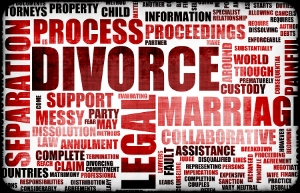Divorce Property Settlements: A Step by Step Guide to Navigating Your Bankruptcy
Submitted by Rachel R on Thu, 02/07/2013 - 11:54am

If you’re considering filing for bankruptcy, you need to know how it will affect all aspects of your financial situation. If you’re divorced and the divorce decree involved a property settlement where you owe your ex-spouse significant sums of money, you need to know how that can play out in your bankruptcy case. Here’s everything you need to know about bankruptcy and divorce property settlements:
Chapter 7 Bankruptcy and Divorce Property Settlements. If you decide to file a Chapter 7 bankruptcy (because you have very few assets and the ones you do have are exempt, meaning you’ll get to keep them), you need to be aware that non-support obligations such as property settlement claims are fully non-dischargeable. You will still need to make good on the terms of property settlement. That was one of the many changes that resulted from passage of the Bankruptcy Abuse Prevention and Consumer Protection Act (BAPCPA) in 2005. Previously, such property settlements could be discharged in a Chapter 7, but no longer.
Chapter 13 Bankruptcy and Divorce Property Settlements. Things are different, however, in a Chapter 13 bankruptcy filing, which is the kind you use when you have good enough income that you could catch up on many of your debts through a payment plan that is set up for 3-5 years. In a Chapter 13, divorce property settlements can potentially be discharged. This could include an agreement where you took on a mortgage payment or a car payment, as well as any kind of family court award (other than support obligations in the form of alimony or child support). Even if some of the items in the divorce decree are called “alimony,” the bankruptcy court can determine that they aren’t really in the nature of spousal support, meaning they could be discharged. If you ex-spouse is named as a creditor in your bankruptcy case, he or she will be notified of that, and they might try to file a complaint to make the property settlement items non-dischargeable, but as long as those items are not true alimony or child support, they should be dischargeable. What makes the debt non-dischargeable is that it is an unsecured debt, which is not a priority debt in a Chapter 13 filing. The only way this could be different is if the ex-spouse had a lien placed on the property (such as a house) that you are supposed to be paying for, but that’s rare.

Image source: sidneydiamond.com
As an example, if your divorce decree says you have to take over payments on a joint credit card debt, that debt may be discharged, and the lender could then turn to the ex-spouse and require them to pay. What’s going to happen in bankruptcy is that the court is going to look carefully at who is harmed more by the bankruptcy and try to minimize that harm. If the ex-spouse who is owed money will experience more harm than the debtor who is filing for bankruptcy, that will be taken into account, and could prevent the discharge of the property settlement debt. Even if the property settlement debt is discharged in a Chapter 13 filing, your ex-spouse might force a return to family court to show that he or she is being harmed by not receiving the property settlement, and may seek to increase alimony or child support to make up for i
The above scenarios should make it clear to you that filing for bankruptcy can be quite complicated, especially when divorce property settlements are thrown into the mix. It is essential that you retain a qualified, reputable bankruptcy attorney who can address your unique situation and guide you through the process.
Dedicated to helping residents of North Carolina find the best solutions to their debt problems. Don’t waste another day worrying about your debt. Call 1-800-899-1414 today to schedule a free initial consultation to discuss your bankruptcy options.

